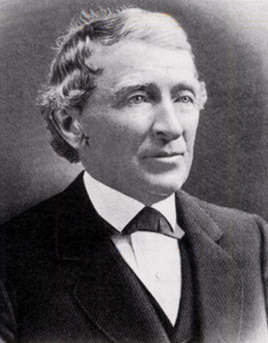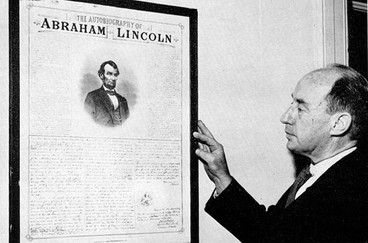Jesse Fell (1808-1887)
“I have a decided impression that if your popular history and efforts on the slavery question can be sufficiently brought before the people, you can be made a formidable, if not a successful, candidate for the Presidency.” - Jesse Fell to Abraham Lincoln, 1858 |
|

- Met Abraham Lincoln in 1834 while lobbying for the annexation of McLean County in the former state capital, Vandalia.
- Fell and James Allin helped produce Bloomington’s first newspaper, The Bloomington Observer and McLean County Advocate in 1836. He eventually ran The Pantagraph.
- Founder of Illinois Normal State University in 1857 - a school designed for the training of educators
- Key organizer of the Lincoln-Douglas Debates.
- At the McLean County Republican Convention in 1858 (Fell was the secretary), Fell’s resolution endorsing Lincoln for U.S. Senate led to Lincoln’s unanimous nomination at this meeting and at the State Convention in Springfield where Lincoln delivered his now-famous “House Divided” speech.
- Lincoln provided a letter of introduction for his presidential nomination to Fell in 1859 that is now know as his autobiographical sketch.
Lincoln-Douglas Debates (1858)
|
Jesse Fell had suggested a series of debates between Lincoln and Stephen Douglas as early as 1854. He helped to organize the speaking tour for the two Senatorial candidates. Explore the text and close readings of these debates. In addition, the House Divided Project's Lincoln Douglas Debates Classroom and Allen Guelzo's Houses Divided: Lincoln, Douglas, and the Political Landscape of 1858 offer excellent resources on the debates.
|
|
Lincoln's Autobiographical Sketch (December 20, 1859)
View close readings and other resources on the Autobiographical Sketch at the House Divided website. The following annotated text was completed by the House Divided Project. Also, Harold K. Sage's scholarly article, Jesse W. Fell and the Lincoln Autobiography provides a detailed background to this compelling document.
Read “Autobiographical Sketch” by Abraham Lincoln on News Genius
The Adlai Stevenson Connection
 Adlai Stevenson hanging Lincoln's autobiographical sketch.
Adlai Stevenson hanging Lincoln's autobiographical sketch.
As a native son of Illinois, Stevenson showed much interest in its history and Abraham Lincoln in particular. Adlai Stevenson's maternal great-grandfather, Jesse W. Fell, was Lincoln's friend and ardent supporter.
Thus, by family history, Adlai Stevenson had been introduced to Abraham Lincoln. Historian Kenneth S. Davis describes Stevenson's fascination with Lincoln and Illinois history:
"Public views of Stevenson as one who moved and had his being in the Lincoln tradition were enhanced by the Governor's obvious love affair with Illinois history. "
One of his earliest acts was to establish direct and well-used lines of communication between his office and the Illinois State Historical Library, whose head, State Historian Jay Monaghan, was the author of widely read books on Lincoln and Illinois history. From the library he obtained a carefully selected group of books for his office shelves and oil paintings by Illinois artists to hang on the mansion walls.
Out-of-town visitors to the mansion were captivated, either by the Governor himself or by an appointed guide, to reconstructed New Salem, to Lincoln's tomb, to the house on the corner of Market and Eighth--and these visitors spread abroad tales of the Governor's total immersion in Lincolniana and of his fondness for the company of such famed Lincoln scholars Monaghan, Benjamin Thomas, then at work on his classic one-volume biography of Lincoln, and Carl Sandburg" (Davis, The Politics of Honor, p. 200).
Thus, by family history, Adlai Stevenson had been introduced to Abraham Lincoln. Historian Kenneth S. Davis describes Stevenson's fascination with Lincoln and Illinois history:
"Public views of Stevenson as one who moved and had his being in the Lincoln tradition were enhanced by the Governor's obvious love affair with Illinois history. "
One of his earliest acts was to establish direct and well-used lines of communication between his office and the Illinois State Historical Library, whose head, State Historian Jay Monaghan, was the author of widely read books on Lincoln and Illinois history. From the library he obtained a carefully selected group of books for his office shelves and oil paintings by Illinois artists to hang on the mansion walls.
Out-of-town visitors to the mansion were captivated, either by the Governor himself or by an appointed guide, to reconstructed New Salem, to Lincoln's tomb, to the house on the corner of Market and Eighth--and these visitors spread abroad tales of the Governor's total immersion in Lincolniana and of his fondness for the company of such famed Lincoln scholars Monaghan, Benjamin Thomas, then at work on his classic one-volume biography of Lincoln, and Carl Sandburg" (Davis, The Politics of Honor, p. 200).

